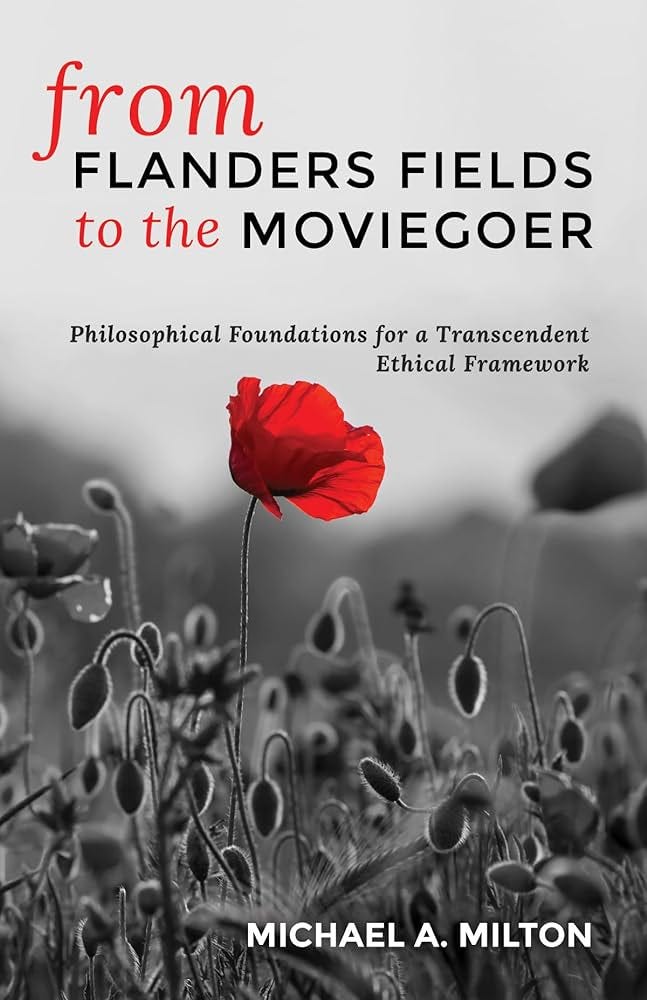Now in Logos
From Flanders Fields to the Moviegoer: Philosophical Foundations for a Transcendent Ethical Framework
We are pleased to announce that Logos, the leader in Bible and Biblical-theological research software, has chosen to publish one of our books on public theology: From Flanders Field to the Moviegoer: Philosophical Foundations for a Transcendent Ethical Framework
To pre-order at a discount visit https://www.logos.com/product/192435/from-flanders-fields-to-the-moviegoer-philosophical-foundations-for-a-transcendent-ethical-framework
All formats remain available at Amazon and other online and physical stores: https://www.amazon.com/Flanders-Fields-Moviegoer-Philosophical-Transcendent/dp/1725251493?nodl=1&dplnkId=096cb99a-76f9-45b7-82ad-bdc07117e128
Logos Overview
How do educators, clergy, attorneys, and the concerned public come to terms with meaningful, workable ethics in an age that eschews any attempt to define truth and error? Michael A. Milton has addressed that question in the new monograph, From Flanders Field to the Moviegoer: Philosophical Foundations for a Transcendent Ethical Framework. Milton draws on English literature, sociology, history, public policy, and theology to mark milestones in the cultural journey from the philosophical crisis after World War I, the end of modernity and the introduction of the “theater of the absurd” in post-modernity. Rather than merely a survey, this monograph proposes a “way forward” in teaching metaphysical ethics. Originally given as a paper before American and British defense leaders in Washington, DC, Milton’s original paper is now expanded for use in undergraduate, graduate, and postgraduate classrooms, as well as libraries and professional military education.
Features
The Logos Reader Edition encourages practitioners of ministry, law, medicine, arts, and sciences to better locate the philosophical foundations of ethical education. In doing so, it examines the philosophical skepticism of the post-World War I era, and considers the ontological ethical response in the Army Ethics White Paper.
The book is comprised of several chapters which include
• Introduction
• The Transformative War
• Postbellum Poetry as Signs of Ethical and Philosophical Frustration
• Modernity’s Failure and Postmodernity’s Madness
• Mother’s Knee Ethics or Civic Ethics?
• An Unlikely Case Study in Transcendent Ethics
• Moral Man and Immoral Society: Niebuhr’s Ethic
• A Way Forward
Through these chapters, the book explores different aspects of ethics and philosophy and draws from real-life examples to illustrate the concepts discussed. It analyzes the failure of modernity and the madness of postmodernity and raises questions about the role of civic ethics and mother’s knee ethics in shaping ethical education.
Additionally, the book delves into case studies and examines transcendent ethics, and highlights the ethical principles proposed by Niebuhr’s ethical theory. Finally, it suggests a way forward for practitioners and educators to better understand the philosophical foundations of ethical education and to apply these principles in their professional and personal lives.
Praise for the Book
From Flanders Fields to the Moviegoer is a history of philosophical ethics between the world wars and down to the present. It focuses on the teaching of ethics in the military, with which Milton is especially familiar. . . . I learned much from his descriptions and evaluations. I hope this book gains a broad readership.
—John M. Frame, Professor Emeritus of Systematic Theology and Philosophy, Reformed Theological Seminary
Dr. Michael Milton offers a thoughtful, historical, and logical solution for some major challenges of the twenty-first-century military: suicides are increasing, PTSD is wanton, and modern ‘philosophies’ are not helping battle-scarred warriors. His proposal to return to a ‘transcendent ethic’ is convincingly ‘on target.
—Douglas E. Lee, Chaplain, Brigadier General, US Army (retired); executive director, Chaplain Alliance for Religious Liberty
In the end, Milton has successfully pulled from his entire, distinguished career in the academy, church, and military to provide a concise but profound framework to answer the deep ethical questions facing today’s military service members—a bright ray of hope for those facing the dark challenges and memories of war.
—Scott Manor, President and Associate Professor of Historical Theology, Knox Theological Seminary
Our Lord and God, As You rule and overrule to Your glory and Your people’s good, please use this book to strengthen the minds and hearts of believers so that they may stand strong in their faith, recognizing evil and warning of its consequences; and understanding the times and calling people everywhere to repent and believe in the Gospel of Your Son. Through Jesus Christ our Lord. Amen.







